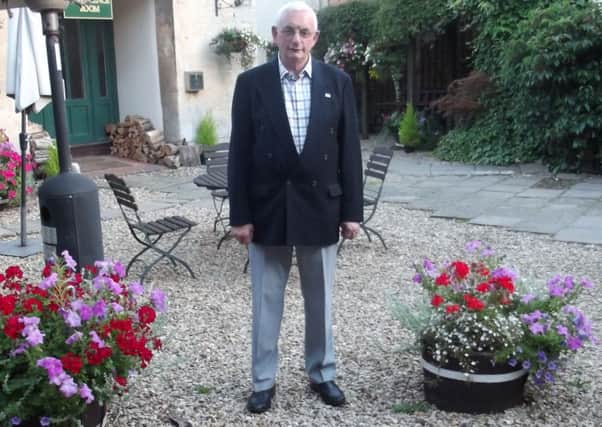Inconvenience overcome


Like any doting grandfather, Michael Illingworth is relishing spending time with his grandson Max.
Together they play football, bounce on the trampoline, and enjoy outdoor adventures.
Advertisement
Hide AdAdvertisement
Hide AdThese moments are particularly precious for Michael, 69, as a treatment for prostate cancer had left him with life-affecting incontinence for years.
This was until a specialist procedure, carried out at BMI Woodlands Hospital, gave Michael his freedom back.
“When I was 56, I took early retirement from my job as managing director of a private textile company after 27 years of service,” explains Michael, who lives in Bradford with wife Paula. “My wife retired at the same time and we enjoyed being free agents, taking four or five foreign holidays a year.”
Michael was fit, well and enjoying life. He was a keen walker and he enjoyed cycling, riding 20 miles a day, several times a week. He was also an avid gym-goer and swam regularly.
Advertisement
Hide AdAdvertisement
Hide AdHowever, during a trip to Alnwick in Northumberland, things changed.
“I displayed first symptoms of an illness which would take over the lives of my wife and I for the next four and a half years. I was passing quite a lot of blood in my urine, so I made an appointment with my doctor as soon as I got home.”
After rigorous tests with an urologist, cancer was initially ruled out. Michael was diagnosed with an enlarged prostate gland and he underwent an operation to reduce it, thinking that it would be the end of his troubles. But it was just the beginning.
Two weeks after his operation, Michael received a call from the clinic where he was treated, informing him that the prostate gland which was removed was in fact cancerous, though in its early stages. Michael was advised to have a radical prostatectomy, the complete removal of the prostate gland. However a side effect of this was that Michael would be incontinent for around six weeks after treatment. However, Michael’s incontinence lasted for years rather than weeks.
Advertisement
Hide AdAdvertisement
Hide Ad“I had to wear full size pads – as big as underwear – which needed changing several times a day. Because of my incontinence, I stopped fell walking, drastically reduced my gym, swim and cycling routine. Even everyday things could be difficult. Life just wasn’t the same.”
To help treat his incontinence, Michael was recommended to have a minor operation. But the treatment, carried out twice, was unsuccessful
However, after being prescribed a course of tablets – again, unsuccessfully – a consultant suggested that Michael would be a suitable candidate for an AdVance Sling. The procedure was available privately, and Michael used his medical insurance to see Simon Fulford, consultant urologist at BMI Woodlands Hospital.
Mr Fulford has been carrying out such implantations since 2006 when he helped to pioneer the procedure in the UK. Since then he has implanted nearly 100 of the devices.
Advertisement
Hide AdAdvertisement
Hide AdSerious incontinence occurs in about 8 per cent of men who have radical prostatectomy for prostate cancer. The sling works by repositioning and supporting the urinary sphincter – the muscle which controls the exit of urine through the urethra. This procedure can help treat incontinence. While there are other options available, implantation was the best option for Michael, Mr Fulford explained.
Initially, Michael was rather reluctant to have another operation.
However, after meeting Mr Fulford, Michael decided to have the procedure.
“Choosing to have the procedure ranks as one of the best decisions of my life. The operation took place on a Friday and I was out of the hospital by Saturday afternoon.”
Advertisement
Hide AdAdvertisement
Hide AdAfter a few weeks of rest, Michael was back to his best and free of the incontinence pads. “I now have no restrictions. I really enjoy playing football with Max and bouncing on his trampoline with him – something I couldn’t even have considered before the operation.
“I am also back at the gym, and will be fell walking next spring. I feel as though I have got my life back again.”
Relief for incontinence
The prostate is a walnut-sized gland that lies just below the bladder; it makes fluid that forms part of semen. Medical advances and prostate screening mean more men are now under going surgery to treat prostate problems.
However, while surgery results are good — 80 per cent of men have fewer symptoms afterwards — it can also cause incontinence in as many as 40 per cent of men.
Advertisement
Hide AdAdvertisement
Hide AdThe AdVance sling is fitted in a 45-minute procedure is carried out under general anaesthetic and antibiotics are needed to reduce the risk of infection.
The sling, which is made of polypropylene mesh, is shaped a bit like a hammock, with two ends, and runs from one side of the groin to the other.
Once tightened behind the pubic bone, the sling works like a backstop, increasing resistance and preventing urine from leaking.